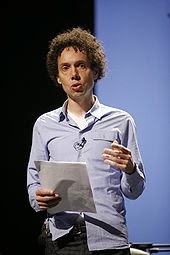The examples Gladwell uses in Outliers encompass all types of meanings of success and all types of people which allows him to establish a strong foundation to his argument. Gladwell uses Bill Gates, J. Robert Oppenheimer, Chris Langan, Joe Flom, Korean Air, The Beatles, Asian ability in math, and the KIPP program, ranging from Californian computer software to New York's major law firms and England's most popular band to the rice patties of Southern China. Gladwell provides a substantial amount of meat to his argument, which, especially with this wide range of examples, is extremely persuading and difficult to disprove.
Gladwell concludes his book with an anecdote about his own family. He talks about his mother, a Jamaican woman who married a Canadian man. But in order to speak about his mother and her life, he talks about people from way before, his great-great-great grandfather who was an Irish immigrant to Jamaica. This Irish man took an interest in a black slave woman and had children with her, and the children came out to be less black. During Jamaica's period of slavery, slaves with lighter skin would be treated better and would do less labor. Due to this, all of Gladwell's predecessors were treated better and were higher up in the societal hierarchy. Then Gladwell talks about his grandfather, a man who loved books and knowledge, and his grandmother, a motivated woman who did whatever it took for her daughter's education. His mother came from this background and had him. Gladwell uses his own story to conclude the book with the fact that the idea that acts of chance, consequences, and opportunities affect someone's life is applicable not only to the few success stories of the world, but to himself and everyone.
Malcolm Gladwell

No comments:
Post a Comment